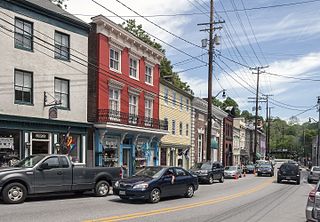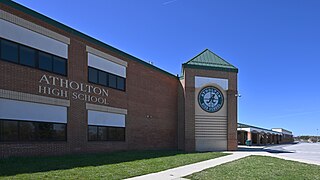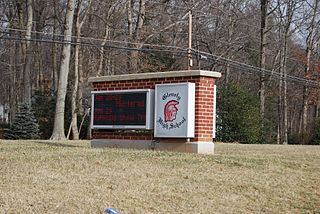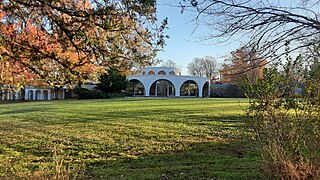Howard County education history
Early education
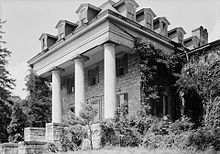
In 1723, Maryland enacted a bill requiring a school in each county. [9] Rev Joeseph Colebatch, Col Samuel Young, William Locke, Charles Hammond, Capt Daniel Maraitiee, Richard Warfield, and John Beale were commissioned to buy land and build schools in what was then Anne Arundel County. [10] Ellicott City opened its first boys' school in the Weir building in 1820. [11] In 1835, the state declared Ellicott's Mills a primary school district. [12] In 1839, the Howard District of Anne Arundel County was formed.
Early schools were funded and managed independently through towns, investors, the state and churches. Some early examples were St. Charles College, incorporated in 1830 near Doughoregan Manor, Patapsco Female Institute (1833) in Ellicott City, and Mount St. Clement (1867) at Illchester. [13] By 1847, the Howard District operated 20 single-room school houses.
By 1853, the law required each school to have three trustees and one clerk appointed in one year terms by vote. [14] In 1864, Maryland created the state board of education for public education, leaving counties to control their own school boards. Teachers' pay was increased to $100 per quarter. [15] [16]
The Patapsco Female Institute was the first women's school to receive state funding.
After the Civil War, single-room schoolhouses within walking distance of communities were built throughout the county.
In 1885, former Maryland Governor John Lee Carroll joined the school board along with J. T. Williams and John W. Dorsey. [17]
In 1894, Chairman Robert A. Dobbin and the remainder of the county school board were indicted for receiving money in excess of per diem. [18]
In 1905, corporal punishment was tested in the courts after Highland School teacher Cora Burgess was fined for whipping a student, an act that would be banned by the state 88 years later. [19]
1920s
In 1922, the State of Maryland authorized $600,000 in bond sales for Howard County expenses. A cap of $60,000 was placed on school improvement expenses, and $540,000 was required to be allocated to road construction. [20]
By the mid-1920s some children rode to school on private produce trucks. In 1928, the first county school bus service started. [21]
During the period,[ clarification needed ] 156 Rosenwald Schools were built in Maryland for teaching African American children. In Howard County, the five-teacher school in Cooksville, the two-teacher Guilford school was constructed, and the one-room Elkridge school. [22] Superintendent W.C. Phillips commissioned a more robust stone high school for Ellicott City with a cornerstone laid in November 1924. [23]
Depression era
Former Justice of the Peace and Coroner Stanley E. Grantham served as board president until World War II. [24]
In 1937, the school system dropped the practice of charging students for bus fare to its schools, as well as transporting parochial students. It also dedicated its first classroom in Savage for "backward" special needs students, and implemented its first modular classroom to hold students until repairs could be made to an unsafe school. Future commissioner and board member Charles E. Miller started his own bus service and vehicle sales to the county. [25]
In 1938, many single-room school houses were sold to private bidders, and multiple elementary and high school projects were started, using 45% Federal Emergency Agency grants to reduce unemployment and set fair wages. In 1939, the county issued its first school bonds, borrowing $107,000 for construction of Ellicott City Elementary, Clarksville Middle, Clarksville High, and Highland Colored School. From this date to present, the county has maintained public debt interest expenses for school expansion. It also consolidated all insurance under one broker, W. Emil Thompson, a candidate for state senator. [26] [27]
WWII era
In 1941, hospital owner and land developer Issac Taylor became board president. As early as November 1940, the board expressed concerns about selective service pulling away most of the male teachers for military service.
The same year, gun lockers were installed in the Ellicott Elementary gym for the local guard, and the board terminated Norman Schussler for "unamerican" behavior and not wanting to serve his country.
African American school teacher Effie Liggans Scott was released for working while pregnant. [28] [29]
When conscientious objector Richard McCleary refused to salute the flag in class, the board made a policy to dismiss the student from school. [30]
By late 1944, school construction was at a standstill and there was a shortage of qualified teachers. The board focused on teacher bonuses and bus contracts.
After the war
At the war's end, Eleanor M. Cissel became the president of the board. Her family was active as school bus operators in the county, and Charlie Cissel taught at the Lisbon agriculture school.
The state board of education mandated classroom sizes be reduced to 35 from 40 and the addition of a 12th grade. [31]
In 1946, future County Executive Omar Jones started as an Agriculture teacher. [32]
Physical education was funded for the first time in 1947, and the budget nearly doubled since the beginning of the war, without significant school construction or student population changes.
In 1948, a single centralized county high school with busing was proposed, but the $1,000,000 cost was considered prohibitive. [33]
The only major program funded in the decade since the PWA money grants was the agriculture shop at Lisbon, which ballooned from $8,000 to over $18,000 in construction costs by 1949. [34]
1950s
In 1949, John H. Brown became the board president. After 10 years without school construction, the county awaited legislation for bonds that could be paid off in the 20-year design life of the buildings, leaving the county without debt by 1969. A single central high school design was modified to one that would serve three districts, and plans for additions to Clarksville, Libson, and West Friendship were made at an estimated cost of $875,000.
Newspaper publication of the school budget was refused, and replaced with a mimeograph supplied on request.
This was also the first year that the school board met with representatives regarding the combined impact of schools with water, sewer, and roads. Four colored and one white schools without water were funded for new wells. School buses and drivers were inspected for the first time.
The board expanded to four members in May 1949 with the addition of Norman H. Warfield, and a new position of County Superintendent was created and given with Warfield's vote to John E. Yingling.
In 1949, future land developer and County Executive Norman E. Moxley was hired in a new position as chairman of the school building commission. [35]
The school board remained self-elected by its own four members with one-year terms.
By 1952, the first major subdivisions were started in Ellicott City, prompting the League of Women Voters to express concern. The school board noted that there was plenty of land in the county for schools, just little funding for new buildings. The planning board provided the first listings of building permits to the school board showing growth rates nearly doubling in three months. School salaries were raised to a base of $3,000 a year, and the student-to-teacher ratio was lowered to 33. [36]
In 1953, Maryland expanded the loans for new schools to $514,000, and driver's education classes began. [37]
In 1955 Charles E. Miller was elected president of the board.
In 1956 football was expanded from six-man to eleven-man teams, with games to be played at Howard High School.
Maryland governor J. Millard Tawes appointed Gertrude Crist to the school board in 1959. [38]
1960s
In 1962, Senator Frank E. Shipley bypassed the state school board nominating commission recommendation of Fred Schoenbrodt, and installed Clifford Y. Stephens. [39]
The school board proposed an ambitious $3 million expansion of Howard High, and administration buildings funded by a 6% increase in property taxes for anticipated growth. [40]
In October 1963, Stephens was indicted for price fixing milk and died soon after in an automobile crash. [41] [42] His death reduced the school board to two people, and there was a lengthy board process to recommend a replacement candidate to the governor. [43] Senator James A. Clark Jr. recommended a change. The school board expanded to five members in 1964, all chosen by the governor (J. Millard Tawes): James Moxley Jr, Fred Schoenbrodt, Gertrude Crist, Austin Zimmer, and Edward Cochran.
In 1965, the county implemented a .25% transfer tax to fund new schools and parks, netting $70,000 in its first nine months. [44] The school board estimated 39,600 pupils by 1980, missing the mark by 15,000. [45]
In May 1966, the Howard County Citizens Association confronted Howard Research and Development for using 700 acres of school property bought by the county at market rate to count as part of the 3200 acres of open space promised for the Columbia development plan. Rouse comprised slightly by not including school buildings as open space in calculations, and donating land for schools not already purchased with a "maintenance fee" for the transfer. [46]
In 1966 the Elementary and Secondary Education Act was passed. Howard County shared $75,000 in title III planning grants with Caroll County, and $110,000 in Title I grants for 466 students who qualified for low income family education. Councilman Norman E. Moxley's Normandy Insurance was awarded an insurance contract for BOE vehicles. The Central Maryland News and Times requested that the county stop its closed door policy on school board meetings. Meetings remained closed, but controlled press releases were resumed. A foundation recommended the school system start using a centralized computer based education system, and another recommended outdoor classrooms. [47]
In 1967 Howard County attempted to consolidate its offices in Ellicott City. The board of education declined, and offered to relocate to the recently vacated Harriet Tubman School Building. [48] County commissioners approved the formation of a community college. In 1968, Thomas M Goedeke was selected from Baltimore County to become chief of public education, serving until 1984, replacing 42-year veteran John E. Yingling. [49] Future county executive Edward L. Cochran became head of the school board. [50]
Desegregation
Early education was not available for African Americans in Howard County. In 1872, Maryland state law required the creation of at least one school for each district with over 15 school-age colored children. [51] The Howard County school system was segregated since the law, funding four teachers using rented rooms in 1873. [52] Dedicated schools began with the building of the Ellicott City Colored School in 1888. Worn school books were provided from white schools. [53] In 1917, colored schools operated 7 months by state law. In 1936, Cooksville became the first school to offer an 8th grade curriculum. This was expanded to four years in 1939, but only offered at single school. [54] In 1938, African American teachers petitioned for equal salaries, and Superintendent S. E. Grantham and the commissioners felt they could not allow an additional $7,500 in expenses, ending the effort. [55] In 1940, a Federal Court mandated equal salaries, which led the board to offer an extra month's pay if the teachers' union would not litigate against them for equal salaries. [56] In the urgency following the Pearl Harbor attack, teachers from all races trained together on First-Aid for the first time. The racial equity less apparent when the board announced in September 1942, that students seeking clinic aid for syphilis could only use colored buses, because using a white bus was considered improper. [57] By 1949, the Cooksville School had 79 students for one teacher. In 1952 Howard County operated 8 elementary, two junior high, and three high schools for 3,790 white students. There were 9 "colored" elementary and one high school with 976 students. [58] The school board recognized overcrowding, and noted that colored students would soon be requesting modern indoor bathrooms like other schools in the county. In 1954, segregation was outlawed by the supreme court in Brown v. Board of Education. With clear direction from the supreme court, the school board, which included future county commissioner Charles E. Miller, delayed action. [59] In November 1955, a citizens' committee on desegregation was formed and asked to report its findings in 1956 for the 1956–1957 school year. The NAACP wrote the board asking why they were not following the Supreme Court decision and county PTA organizations disagreed with the county's plans to continue segregated bus service to future integrated schools. [60] [61] In July 1957, the Maryland Court of appeals threw out a residential legal effort to block the Supreme Court's authority on county integration plans. [62] On July 13, 1963, the board of education put together a plan to desegregate schools, which was put into effect in November 1963 with a plan to continue partial segregation until 1967. [63] The chairman of the NACCP education committee Robert H. Kittleman, threatened demonstrations if the school board would continue segregation past 1964. [64] The bounty's official plan to eliminate segregation was approved by Francis Keppel, the United States Commissioner of Education, in July 1965 days before the passage of desegregation requirements in the Housing and Urban Development Act of 1965 which helped finance new town of Columbia. [65] Howard County eliminated one class of segregated students a year, taking 11 years to implement integrated classes. [66] [67] [68]
1970s

With the development of Columbia, the school system shifted its emphasis on neighborhood schools. [69] The school board faced complaints of children from new developments in Columbia being districted in outlying underutilized schools because the developer promised a "Columbia School System" in its sales marketing. [70] In 1972 the Office of Civil Rights questioned the lack of African Americans in administrative positions. Dr. Goedeke responded by saying there was a lack of qualified applicants, and that African American teachers who ran colored schools prior to integration were "teacher-principals" or "teachers-in-charge" who were not qualified as administrators under present-day considerations. [71]
In 1974, school budgets produced a surplus of $200,000 from bond investments that were returned to the general funds. [72]
Future County Executive Charles I. Ecker was brought on as superintendent for Howard County schools, serving until 1989. [73]
In 1976, arbiter Robert I. Bloch ruled that the school selection board had improperly used race and non-professional factors in the review of Charles Griffin for pupil personnel supervisor. [74]
The county opened the first conjoined elementary school and middle school with Dasher Green Elementary and Owen Brown Middle. [75] Wilde Lake High School was the first high school in Columbia to open (1971) and Wilde Lake Middle School was the first middle school to open (1969).
1980s
Prior membership in the school board was by selection. In 1982, William Manning became the first African American elected to the 118-year-old school board. [76]
In 1984, each school was supplied with 23-45 Apple IIe computers, starting the first education efforts in programming. [77]
1990s

In 1992, Superintendent Micheal E. Hickey proposed a $250 million plan to expand the school system by 15 schools. [78] By 1993, the school board voted to delay school construction and look at construction cost savings. [79]
2000s
In 2006, Howard County set a health policy, limited birthday celebrations to once a month, and banned home baked cookies or cakes with cream filling. [80]
2010s
In 2012, the county partially outsourced support for children with autism to the Linwood Center.
In 2013, the common core system was implemented. Also known as "Race to the top," the common core curriculum was implemented to help students understand and solve problems on their own.
In 2014, the school computer systems are targeted by a cyber attack. [81]
Later that year, the Howard County-based One Maryland Inter-County Broadband Network won a service contract for network services.
In late 2014, the board approved early retirement options for teachers with over 15 years of tenure, with a projection of 594 employees leaving the system. [82] In 2015 the superintendent suspended citizen review of the yearly budget relying on the Zero-based budgeting process. [83]
In 2017, the construction of the newly rebuilt Wilde Lake Middle School was finished. It was the first net zero energy school in Maryland, and the biggest in the nation. [84]
Residential subdivision
In 1964, the developers of Columbia, Maryland, envisioned an independent year round school system for its residents. A portion of the land bought by Rouse corporation was provided at no cost to the school system to build schools to accommodate the impact from the development. Howard County remained in control of the school system. [85]

As Columbia reached its maximum planned capacity, developers turned to the eastern portion of Howard County served by public water and sewer for infill development opportunities. The Howard County School system increased substantially in size, but development in the county outpaced the number of seats available for students. In 2006, an adequate public facilities ordinance (APFO) was enacted. It temporarily limited development in elementary school districts only which were over 120% capacity. It still allowed developers the ability to proceed with projects three years after submittal regardless of overcrowding. [86] To keep up with demand, the school system developed a method of regular redistricting, moving students to western schools with more capacity. [87] The school system revived the concept of portable trailers in the early 1990s, increasing to 50 units in 1995, 217 by 2013, and 238 in 2014. [88] [89]
| Year | High Schools | Junior High Schools | Elementary Schools | Total Schools | Students | Budget | $ per student (adjusted to 2013) | |
|---|---|---|---|---|---|---|---|---|
| 1847 [90] | 20 (single-room) | 20 | $3900 ($111,423 Inflation adjusted to 2013) | |||||
| 1877 [91] | $1,989.48 (segregated), $488.67 (colored) | |||||||
| 1900 [92] | Combined | Combined | 70 (Grades 1–11 single-room) | 55 (segregated), 15 (colored) | 3,019 | $41,666.49 ($979,680.19 Inflation adjusted to 2013) | $324 | |
| 1929 | Combined | Combined | $123,932 | |||||
| 1936 | Combined | Combined | $161,631 | |||||
| 1941 [93] | 3 (segregated), 1(colored) | No Jr. High | 3,469 | $290,000 | ||||
| 1947 | 3 (segregated), 1 (colored) | No Jr High | 6 (segregated), 8 (colored) | 18 | 3,619 | $520,000 [94] | ||
| 1952 [95] | 3 (segregated), 1 (colored) | 2 (segregated) | 8 (segregated), 9 (colored) | 23 | 4,776 | $1,043,107.00 ($9,162,533.80 inflation adjusted to 2013) | ||
| 1968 | 3 | 20 | 13,000 | |||||
| 1975 | 6 | 7 | 23,992 [96] | |||||
| 1978 | 8 [97] | 11 | 26 | 45 +1 VoTech +1 special needs | 25,606 | $46,100,000 [98] | ||
| 1980 | 8 | 10 | 25,228 [96] | |||||
| 1985 | 8 | 10 | 24,978 [96] | |||||
| 1990 | 8 | 10 | 26 | 30,002 [96] | $155,000,000 (Operating) | $9,520.07 | ||
| 1995 | 8 | 15 | 37,323 [96] | |||||
| 2000 | 10 | 18 | 44,525 [96] | |||||
| 2005 | 12 | 19 | 47,795 [96] | |||||
| 2010 | 12 | 19 | 49,991 [96] | |||||
| 2011 | 12 | 19 | 50,489 [96] | $13,708 | ||||
| 2013 | 12 | 19 | 40 | 71 + 3 special needs | 51,681 | $703,667,400 (operating), $77,490,000 (capital) | $15,263 | |
| 2014 | 12 | 20 | 41 | 73 + 3 special needs | 52,799 | $725,300,000 (operating) | $14,108 | |
| 2017 | 67,639 (est) [96] | |||||||
| 2021 | 12 | 20 | 41 | 73 + 3 special needs | 57,325 [99] |
